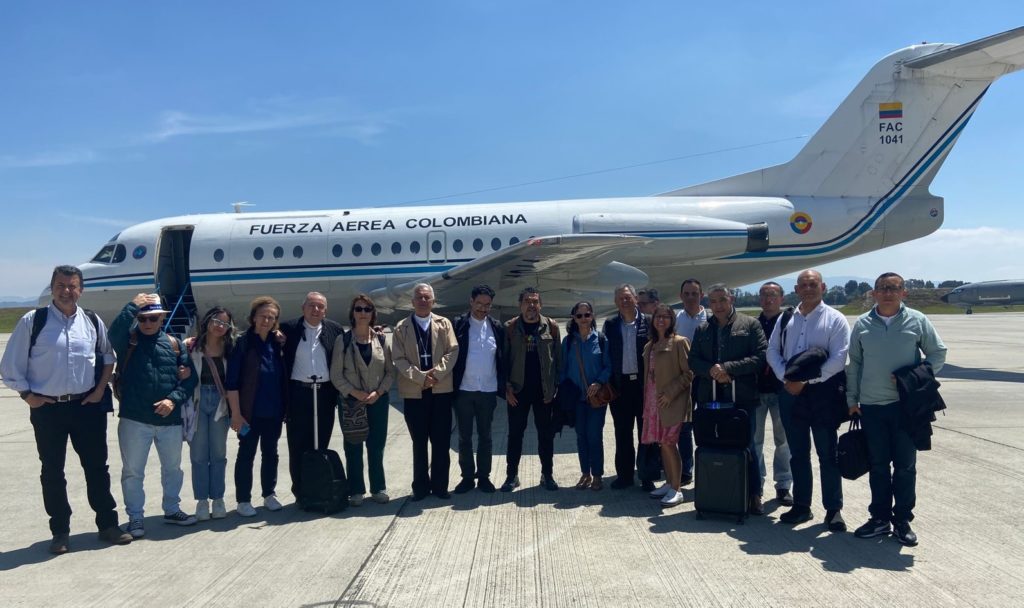
The Colombian government has reacted to the National Liberation Army (ELN) guerrillas’ decision to halt peace talks. The government’s peace delegation is already in Caracas, Venezuela, for an urgent meeting aimed at addressing this setback. Moreover, the next round of peace negotiations, marking over a year and a half of ongoing discussions, was set to resume on Friday, April 12.
In a document, signed in Caracas, the State responds to the guerrilla’s decision today to “freeze” the dialogue table. The illegal armed group accuses the government of “double handling” of the talks and, according to this organization, of promoting demobilization in regions such as Nariño. This attitude, qualified as “conduct contrary to fair play and good faith” by the ELN, has led the table to “a state of freezing”.
For its part, the Colombian government emphasizes the need to continue advancing in the agenda of the talks, while stressing the need to address the serious situation faced by the civilian population in certain departments affected by armed violence, among them Nariño and Choco.
Government urges “not to waste time”
Following the convening of the extraordinary meeting by the ELN, the two peace delegations set out their priorities in separate communiqués made public today. While the guerrillas insist that the government does not “play fair”, the State focuses on the protection of civil society, a direct victim of violence.
In the two most important dialogues held by the State with the ELN and the guerrillas of the Central General Staff (EMC), crises have been a constant. In this regard, it is worth recalling the decision of the government of President Gustavo Petro to suspend the ceasefire in certain regions of the south of the country, where the armed action of the EMC has not ceased, with significant consequences for the population.
Between forced confinements, recruitments, and direct actions against people’s lives, the situation became tense until reaching this difficult decision of the president. Nevertheless, the messages in favor of maintaining talks with illegal armed groups have also been permanent. In this specific case with the ELN, for the Colombian peace delegation, “it is time to concentrate the discussions at the table.”
“It is necessary not to waste time (…) We consider that it is imperative to concentrate the work of the Dialogue Table on advancing in the peace process, making decisions that develop the agenda and addressing fundamental issues of the process”, assures the government’s communiqué.
With a focus on the population of regions such as Arauca, Choco, and Nariño, the State’s peace delegation assures that “it continues to be necessary to address fundamental issues such as the rights of victims.”
Continuing distrust
In all these months of talks, mistrust and cross-accusations have been repeated between the State and the guerrillas. On the one hand, the ELN accuses the government of maintaining an alleged double game with demobilization work in the regions. On the other hand, the State has repeatedly accused the armed group of violating the ceasefire with serious consequences for the civilian population.
Just this week, the United Nations Security Council issued a report in which it expressed its concern about the “upsurge of violence” in Colombia. In this line, the United States and the United Kingdom, permanent members of the council, urged the Colombian president to reinforce security in the areas most affected by armed groups.
At this UN session, the US delegation also condemned the murder of indigenous leader Carmelina Yule Paví, in mid-March in the rural area of Toribio (Cauca), after she accompanied the Indigenous Guard in the rescue of a minor who had been forcibly recruited by the EMC group, the dissidence of the extinct FARC under the command of alias Ivan Mordisco.
However, in his intervention at the Security Council, Carlos Ruiz Massieu, head of the UN Verification Mission in Colombia, valued the Colombian government’s efforts on the path of dialogue to resolve the conflict in the country. “As difficult and patience-demanding as it may be, Colombia’s decision to prioritize dialogue as the primary means to resolve the conflict distinguishes the country as a model that is more relevant than ever in today’s world,” he said in his intervention.
See all the latest news from Colombia and the world at ColombiaOne.com. Contact our newsroom to report an update or send your story, photos and videos. Follow Colombia One on Google News, Facebook, Instagram, and subscribe here to our newsletter.

